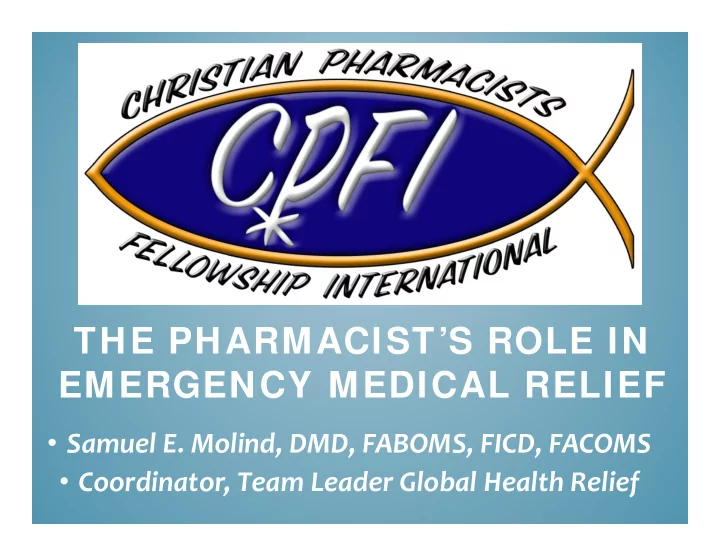

THE PHARMACIST’S ROLE IN EMERGENCY MEDICAL RELIEF • Samuel E. Molind, DMD, FABOMS, FICD, FACOMS • Coordinator, Team Leader Global Health Relief
GHR USUAL CLINICS: • Out ‐ patient clinic setting • Generally ambulatory with mild ‐ to ‐ moderate acute conditions (e.g., diarrhea, pain, infection, dermatologic conditions, etc.) • Patients with common Chronic diseases and moderate –to ‐ severe acute conditions .
Here is what we want and need!!
AREAS FOR A VOLUNTEER TO CONSIDER IN DISASTER RELIEF • Good Health • Good Physical Condition • Harsh Weather • Experienced in Disaster Relief / Missions • Primitive Living Conditions • Security Concerns • Cultural Adaptation
SPHERE CORE BELIEFS • The right to life with dignity and therefore the right to assistance. • All possible steps should be taken to alleviate human suffering .
What is Sphere? Humanitarian Core Protection Charter Standards Principles
Water Supply, Food Security and Sanitation and Nutrition Hygiene Promotion Core Standards Shelter, settlement and Non ‐ Food Health Action Items
SPHERE MINIMAL STANDARDS ARE EVIDENCE- BASED AND REPRESENT SECTOR-WIDE CONSENSUS ON BEST PRACTICES • Water Supply • Sanitation • Hygiene Promotion • Food Security • Nutrition • Shelter • Settlement • Health Actions
HEALTH CLUSTERS: Nightly Health Centered Meetings • World Health Organization • Ministry of Health • International Committee of the Red Cross • Medical Teams (Surgical Hospitals, Medical Centers, Mobile Clinics, etc. • Potable water and Sanitation • Food, Nutrition, Distributions and Security • Shelter and Non ‐ food items
Pharmacotherapy Consults Medication Disease Therapy Management Support Reviews Medication Therapy Health & Management Clinical Wellness Services Consults Medication Immunizations Safety
GREATER COMPLEXITY IN THE DISASTER SETTING Changing Environment with increasing responsibilities and Expectations. • Formulary Composition • • Patient’s Decreased Ability to Challenge of Securing Appropriately Store Medications Medications • • Decreased Access to appropriate Logistics of Receiving nutrition and Hydration Medications • • Limitations to the Healthcare System Safe Storage – From weather and secure from pilfering • Diminished Access to Long Term Care • State of Patient’s Living • Limited Ability to Maintain Continuity Environment of Care • Limited Formularies and the Increased need for Therapeutic Substitutions
THE ONLY CERTAINTY IN A IN A CRISIS- RESPONSE OPERATION IS THE REQUIREMENT TO CHANGE AND ADAPT TO CONSTANTLY EVOLVING DISASTER CONDITIONS AND MEDICAL-RESPONSE CAPABILITIES.
Risk Analysis
Essential Preparedness : • Immunizations • Birth Certificate • Passport • Mirror • Sun Shower • Knife/Leatherman • Cook Pot (eating Utensils, cup, plate • Towels • Mosquito Net –Long Road Travel Tent • Small Fan • Solar Charger • Camera • Extra Hiking shoes • Hat • Sunglasses • Headlamp / Batteries / LE Flashlight • Appropriate personal Clothing.
Packing Your Go Bag • Waterproof duffle bag • Sleeping bag or liner • Air mattress • Pillow • Towels (microfiber) • Waterproof LED flash light • Water Purification Kit • Water Bottle 2 Liter + • Slicker / Raincoat • Toilet Paper • Sufficient amount of Cash • LED Headlamp • Sun Screen / Hat • Cooking / Eating Kit • Personal Hygiene Products • Money Belt • Eye glasses & Sunglasses • Pen & Paper • Socks & Undergarments • Permanent Marker • Change of Shoes & Flip Flops • • Snacks / Light Food Shirts & Pants + Scrubs • Back Pack • Watch • Professional Credentials
We Need YOU as part of our Global Health Relief Team! Pray about it. Sign up – be “On Call” www.cmda.org/ghr Pray for our wholistic Outreach.
China: 10/10 ‐ 24,2014
Recommend
More recommend